Salt And Pepper: The Basics Of Salmon Seasoning
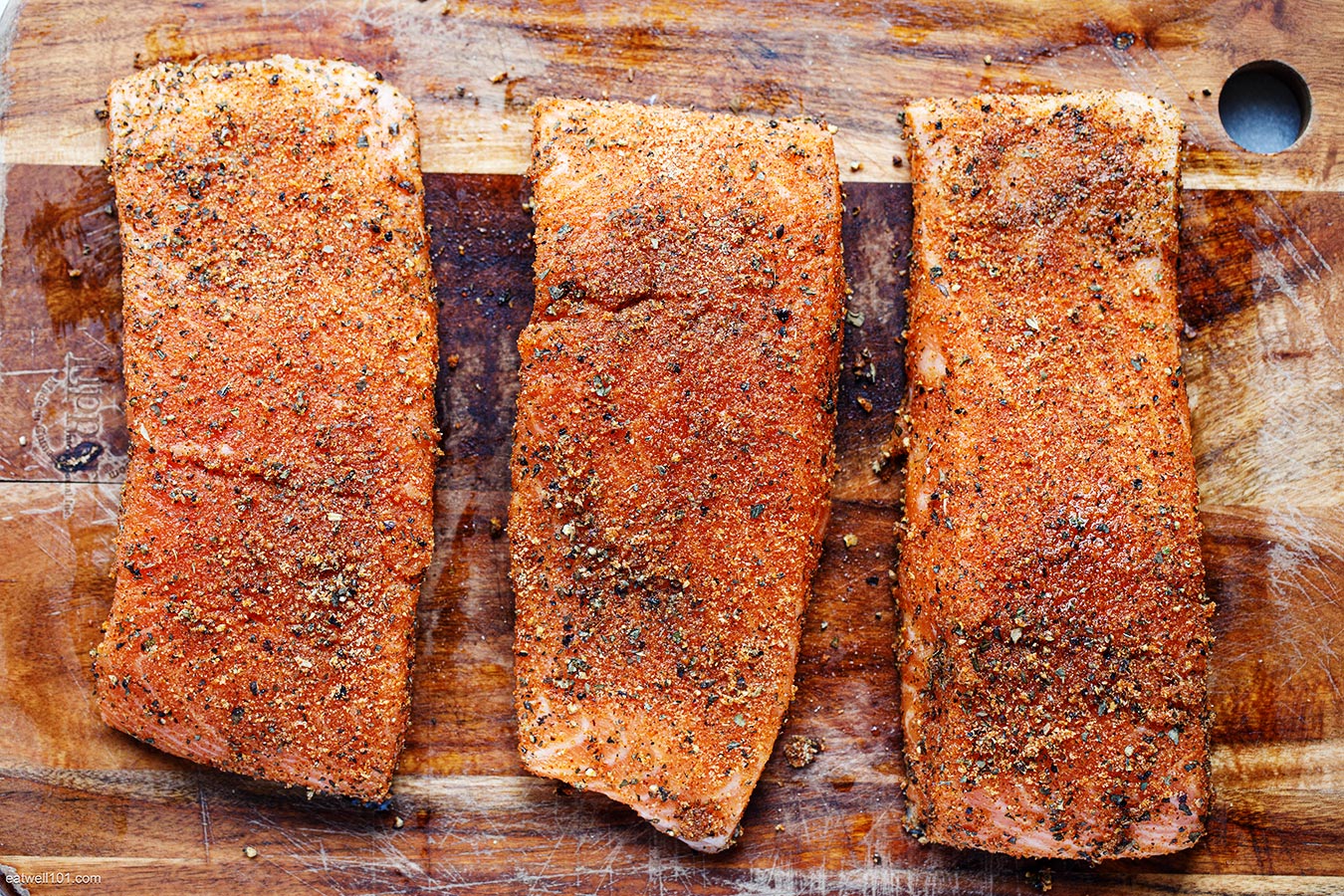
When it comes to seasoning salmon, salt and pepper are the fundamental components to bring out the natural flavors of the fish. Salt helps to cure and firm up the salmon, imparting a savory taste to the dish. Pepper adds depth and a subtle spiciness to enhance the overall flavor profile. Sprinkle the salmon with a pinch of salt and pepper before cooking, ensuring that they are evenly distributed. This simple yet effective seasoning combination allows the natural flavors of the salmon to shine through without overpowering the dish.
Salt And Pepper For Salmon: Enhancing Natural Flavors
Salt and pepper are the foundational elements when it comes to seasoning salmon. These simple ingredients work together to enhance the natural flavors of the fish. Salt helps to cure and firm up the salmon, imparting a savory taste. Pepper adds depth and a subtle spiciness, elevating the overall flavor profile. Sprinkling the salmon with a pinch of salt and pepper before cooking ensures that these flavors are evenly distributed throughout the fish. This basic seasoning combination allows the true essence of the salmon to shine through without overpowering the dish.
Different Types Of Pepper For Salmon: Adding Depth To The Taste
Pepper is a versatile spice that can elevate the flavor of salmon by adding depth and a subtle spiciness. There are various types of pepper that can be used to season salmon, each bringing a unique twist to the taste profile. Some popular options include:
- Black Pepper: This classic peppercorn adds a bold and slightly pungent flavor to salmon. Its subtle heat enhances the natural flavors of the fish.
- White Pepper: White pepper has a milder taste compared to black pepper but still adds a subtle spiciness. It pairs well with delicate flavors, allowing the true essence of the salmon to shine through.
- Szechuan Pepper: This pepper variety has a distinct numbing sensation and citrusy undertones. It adds a complex and vibrant flavor to salmon, especially in Asian-inspired dishes.
By experimenting with different types of pepper, you can create a unique and flavorful seasoning for your salmon dishes. So go ahead and explore the world of peppers to enhance the taste of your salmon to new heights!
Lemon And Herbs: Fresh Seasoning Options For Salmon
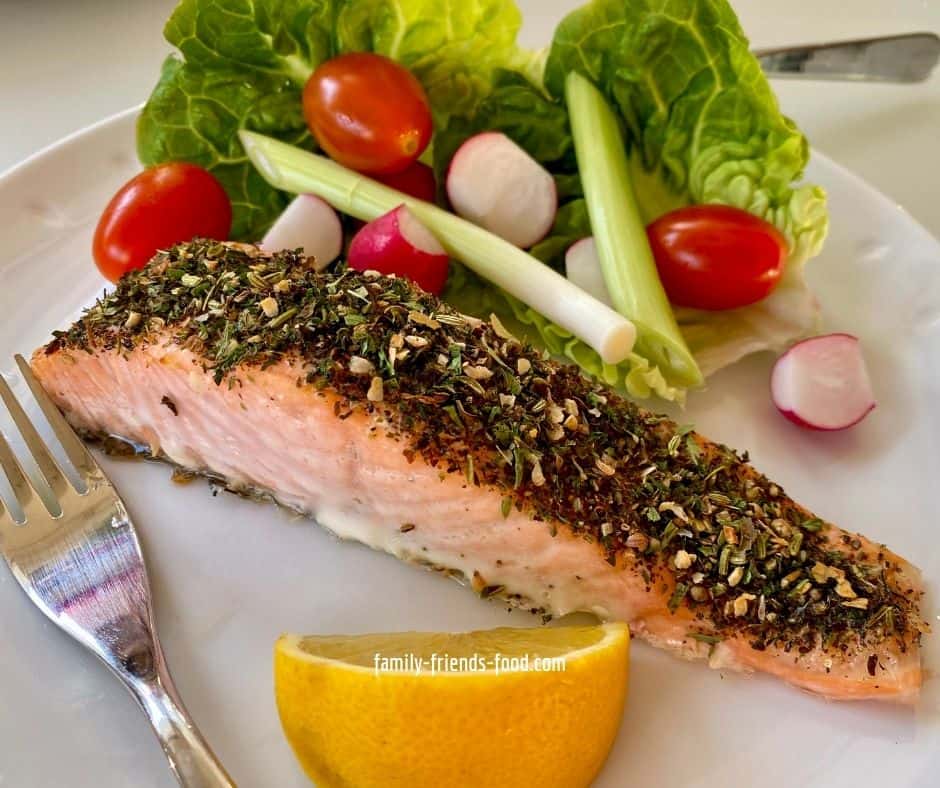
One refreshing and vibrant way to season salmon is by using lemon and herbs. Adding lemon zest to the salmon enhances its natural flavors and provides a brightening effect. The citrusy notes complement the richness of the fish, creating a delightful combination. Additionally, herbs like dill and parsley add a layer of freshness and elevate the dish to new heights. The aromatic and earthy flavors of these herbs perfectly complement the delicate taste of salmon. Experimenting with different combinations of lemon and herbs can create a refreshing and flavorful seasoning for your salmon dishes.
Lemon Zest And Salmon: Brightening The Palate
Lemon zest is a fantastic way to add a burst of freshness to your salmon dishes. The zesty and tangy aroma of lemon perfectly complements the rich and buttery flavor of the fish. The natural acidity of lemon zest helps to cut through the richness of the salmon, balancing the overall taste. The brightening effect of lemon zest not only enhances the flavor of the fish but also adds a visually appealing pop of color to your dish. Sprinkling lemon zest generously over your seasoned salmon before cooking will elevate your culinary experience to a whole new level.
Herbs Like Dill And Parsley For Salmon: Elevating The Dish
Herbs like dill and parsley are excellent choices for seasoning salmon, as they have the ability to elevate the dish to new heights. Dill, with its delicate and fresh flavor, brings a subtle anise-like aroma that perfectly complements the natural taste of salmon. On the other hand, parsley adds a slightly sweet and slightly peppery note, further enhancing the overall flavor profile. These herbs not only add a burst of freshness but also contribute to a harmonious balance of flavors, making the dining experience truly enjoyable. Sprinkling dill and parsley over seasoned salmon before cooking will surely elevate your culinary game.
Spices And Seasonings: Adding Complexity To Salmon
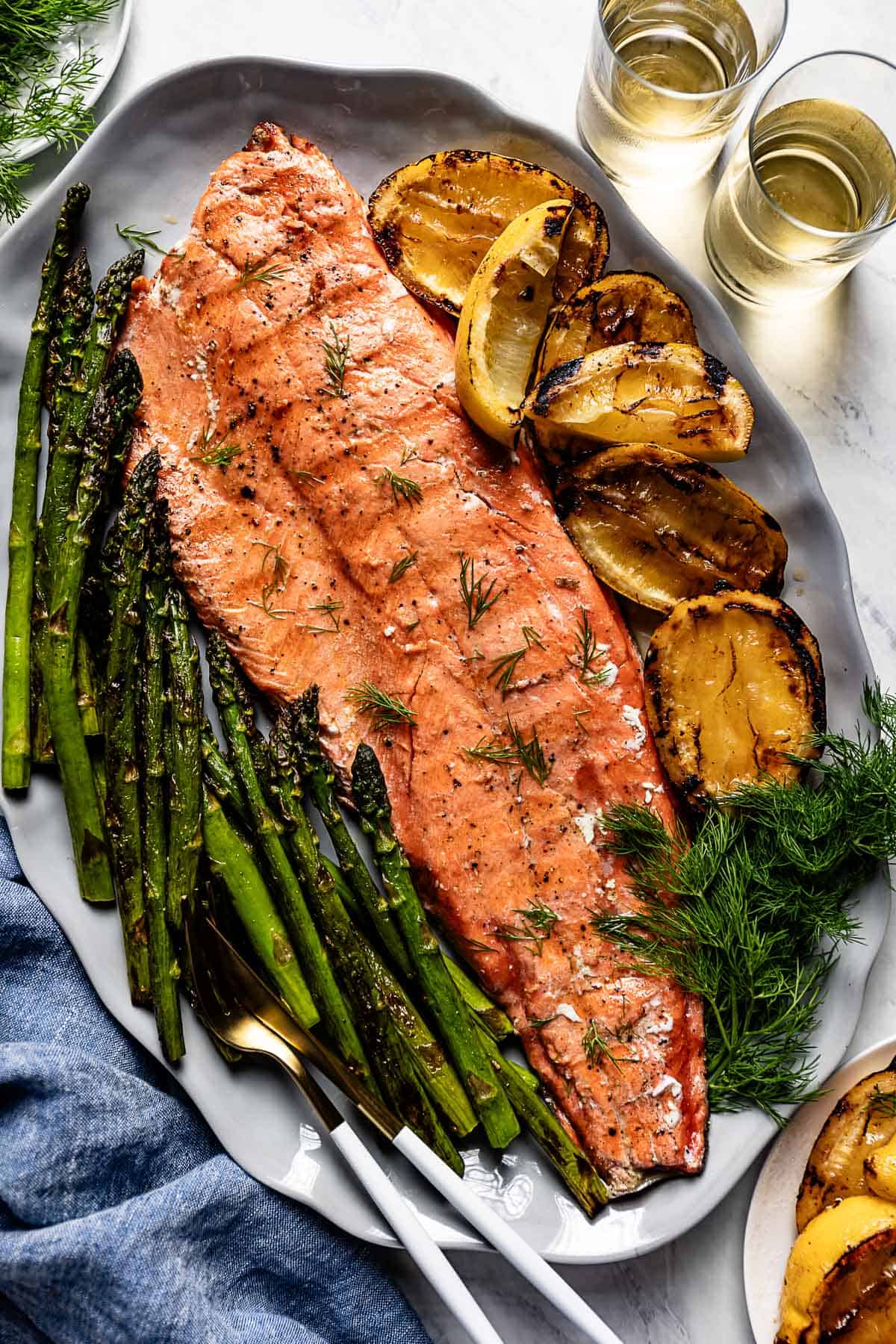
Adding spices and seasonings to salmon can take the flavor profile to a whole new level. Cajun seasoning, with its blend of aromatic herbs and spices like paprika, cayenne pepper, and thyme, adds a flavorful kick to the salmon. Garlic and paprika, on the other hand, bring rich and aromatic flavors that complement the natural taste of the fish. These complex seasonings add depth and complexity, allowing the salmon to become the star of the dish. By experimenting with different spice combinations, you can create a truly unique and flavorful salmon dish.
Cajun Seasoning For Salmon: A Flavorful Kick
Cajun seasoning is a popular choice for adding a flavorful kick to salmon. This blend of aromatic herbs and spices, such as paprika, cayenne pepper, and thyme, creates a deliciously spicy and complex flavor profile. The combination of heat and herbs complements the natural taste of the fish, enhancing its overall appeal. Whether you’re grilling, baking, or pan-searing your salmon, adding Cajun seasoning can take it to the next level. It adds depth and richness, giving your dish a distinct Cajun flair. Experiment with different levels of spiciness to find your perfect balance.
Garlic And Paprika For Salmon: Rich And Aromatic Flavors
Garlic and paprika are a winning combination that adds rich and aromatic flavors to salmon. Garlic brings a pungent and earthy taste, while paprika adds a smoky and slightly sweet note to the dish. The two ingredients complement each other perfectly, creating a harmonious flavor profile that enhances the natural taste of the salmon. Whether you’re grilling, baking, or pan-searing your fish, sprinkling garlic and paprika on top will elevate its flavor to new heights. The garlic infuses the salmon with its distinctive aroma, while the paprika adds a depth of flavor that is both satisfying and delicious. So, don’t be afraid to experiment with these two spices and discover the magic they can bring to your salmon dishes.
Marinades And Sauces: Enhancing Moisture And Flavor Of Salmon
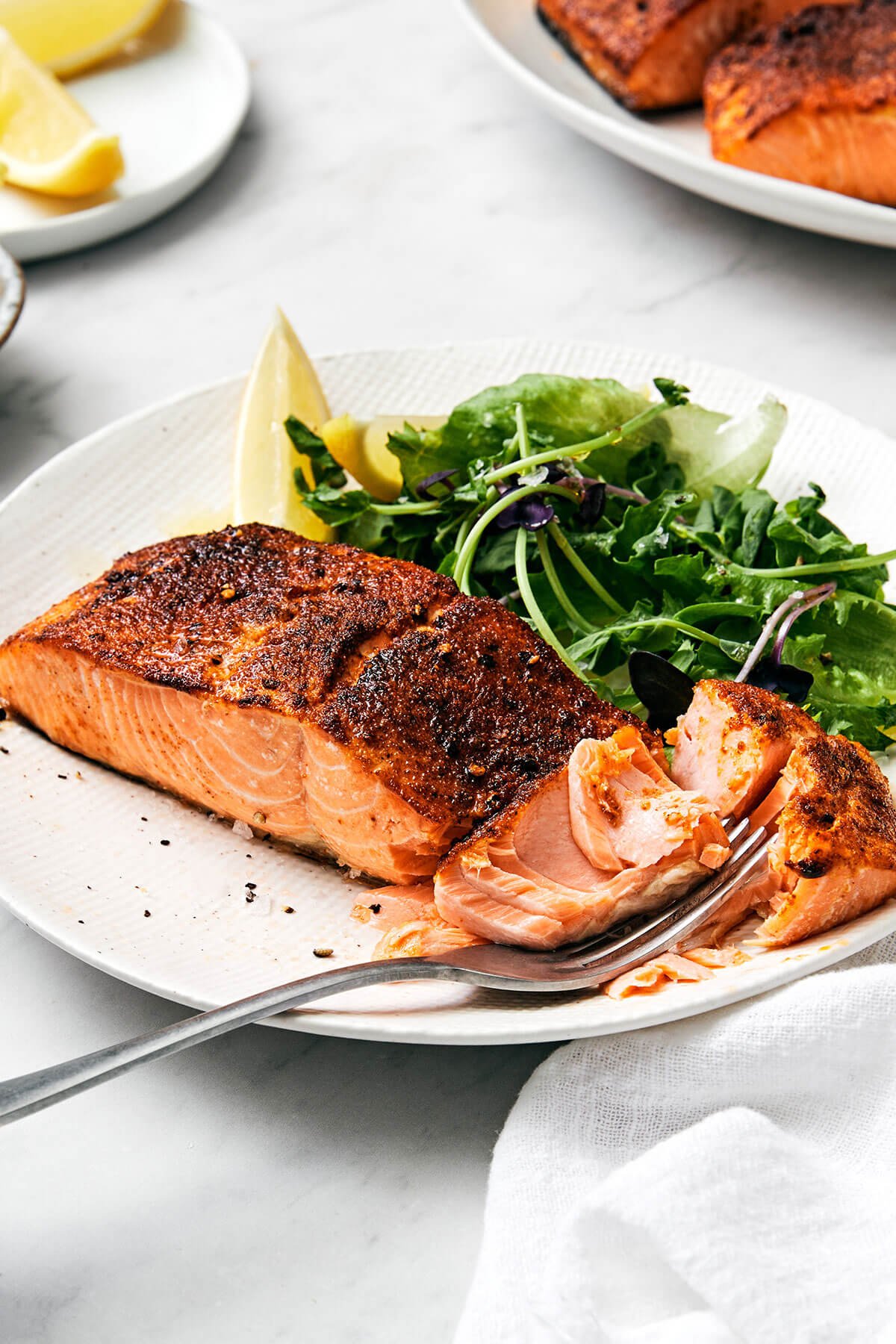
When it comes to enhancing the moisture and flavor of salmon, marinades and sauces are the way to go. Marinades are a great option if you want to infuse your salmon with extra moisture and flavor before grilling it to perfection. A marinade can be a combination of ingredients like soy sauce, ginger, garlic, and honey, which not only adds depth of flavor but also helps to tenderize the fish. On the other hand, sauces can be added after cooking to provide an extra burst of flavor. Whether it’s a tangy teriyaki sauce or a sweet honey mustard glaze, sauces can take your salmon to new culinary heights. So, don’t be afraid to experiment with different marinades and sauces to enhance the moisture and flavor of your salmon dishes.
Note: Check out the recipe section for some delicious marinades and sauces to try on your salmon.
Teriyaki Marinade For Salmon: Sweet And Savory Combination
Teriyaki marinade is a classic choice when it comes to enhancing the flavor of salmon. It combines the perfect balance of sweetness and savory notes, creating a delightful taste profile. The marinade typically includes ingredients like sesame oil, lemon juice, soy sauce, brown sugar, and sesame seeds. The sesame oil adds a nutty aroma, while the lemon juice adds a refreshing tang. Soy sauce brings depth and umami flavor, while the brown sugar provides sweetness to balance the dish. Lastly, the addition of sesame seeds offers a slight crunch and mild nuttiness. When the salmon is marinated in this sweet and savory mixture, it becomes tender, juicy, and packed with flavor.
Honey Mustard Glaze For Salmon: Balancing Sweetness And Tanginess
The Honey Mustard Glaze is a perfect choice for salmon, as it strikes a delicate balance between sweetness and tanginess. The blend of local honey, mustard, turmeric, and garlic creates a glaze that coats the salmon and adds depth of flavor. The sweetness from the honey complements the natural richness of the fish, while the tanginess from the mustard adds a zesty kick. The combination creates a harmonious flavor profile, making the Honey Mustard Glaze an excellent option for those seeking a burst of sweet and tangy flavors in their salmon dish.
Cooking Techniques: Best Practices For Maximum Flavor
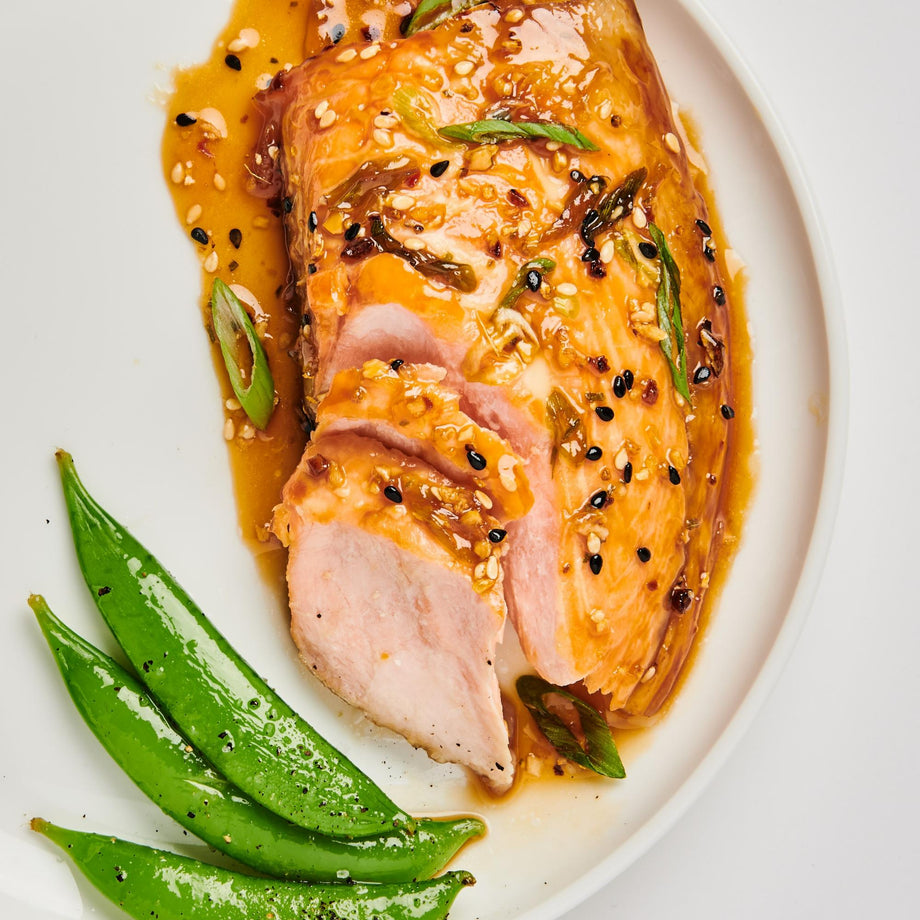
Grilling Salmon: Infusing Smoky Notes Grilling salmon is a popular cooking technique that imparts a smoky flavor to the fish. Preheat the grill to medium heat and lightly oil the grates to prevent sticking. Place the salmon fillets directly on the grill, skin-side down, and cook for about 4-6 minutes per side, depending on the thickness. The high heat of the grill creates beautiful grill marks and caramelization on the fish, adding depth of flavor. Baking Salmon: Retaining Moisture and Flavors Baking the salmon is another excellent technique that helps to retain moisture and flavors. Preheat the oven to 375°F (190°C) and place the seasoned salmon fillets on a baking sheet lined with parchment paper. Bake for approximately 10-15 minutes, depending on the thickness of the fillets, until the fish is cooked through and flakes easily with a fork. Baking the salmon allows it to cook gently and evenly, keeping it tender and moist.
Grilling Salmon: Infusing Smoky Notes
To infuse salmon with smoky flavors, grilling is a popular cooking technique. Preheating the grill to medium heat and lightly oiling the grates prevents the fish from sticking. Place the salmon fillets directly on the grill, skin-side down, and cook for about 4-6 minutes per side. The high heat creates beautiful grill marks and caramelization, adding depth to the flavor. The smoky notes from grilling enhance the overall taste of the salmon, creating a delicious and satisfying dish. Remember to baste the salmon with a marinade or sauce to further enhance the smoky flavor.
Baking Salmon: Retaining Moisture And Flavors
Baking salmon is a popular cooking technique that allows the fish to cook gently and retain its moisture and flavors. Preheat the oven to 350 degrees Fahrenheit and line a baking sheet with foil or parchment paper. Place the seasoned salmon fillets on the baking sheet, skin-side down. Baking the salmon at a lower temperature ensures that the fish remains tender and juicy. It also allows the flavors of any seasonings or marinades to infuse into the fish. Remember to bake the salmon until it reaches an internal temperature of 145 degrees Fahrenheit for optimal taste and texture.
Conclusion
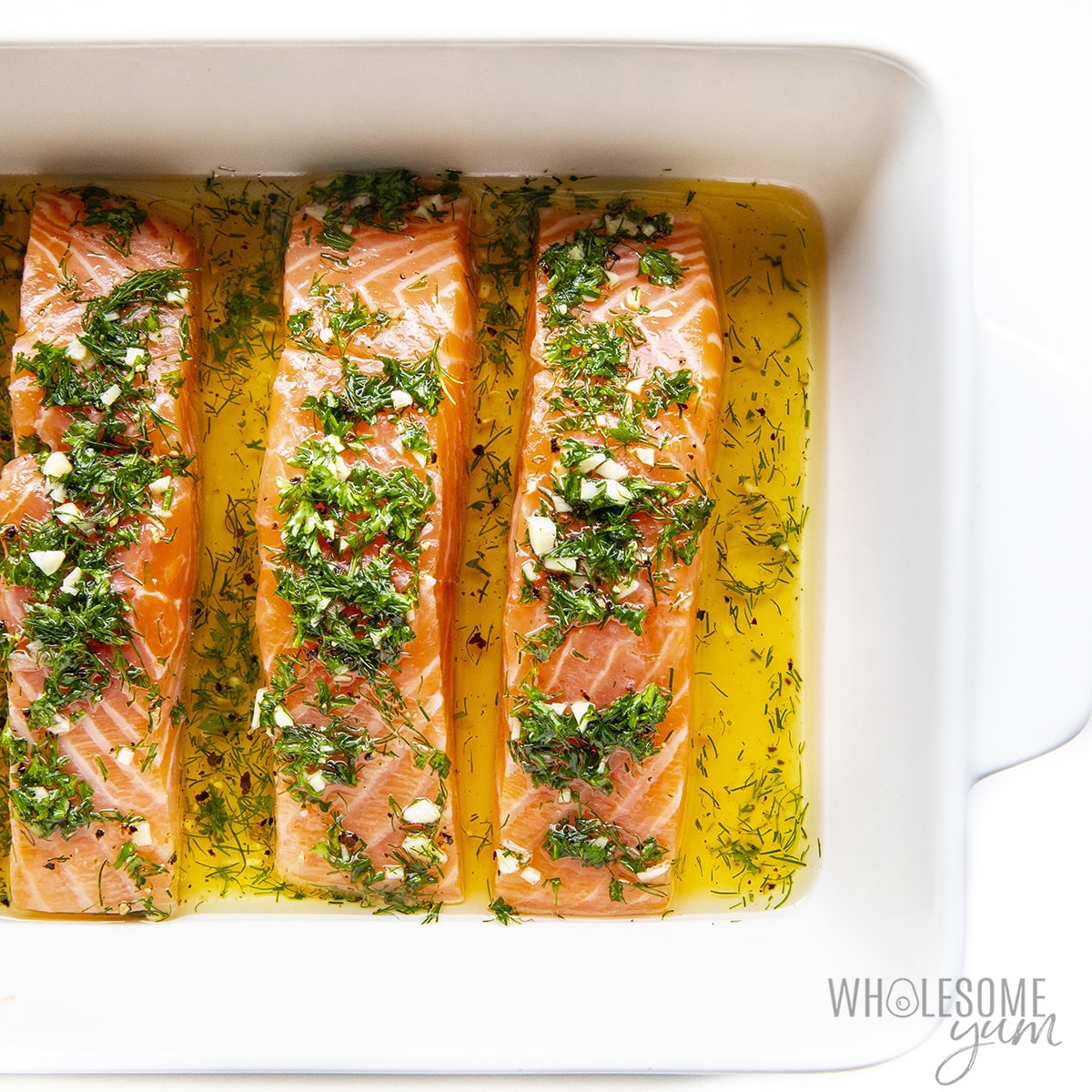
In conclusion, seasoning plays a crucial role in enhancing the flavor profiles of salmon dishes. From the simplicity of salt and pepper to the complexity of spices and marinades, there are countless options to elevate the taste of salmon. By understanding the characteristics of different seasonings and experimenting with various combinations, individuals can create unique and flavorful salmon dishes. Remember to choose seasonings that complement the natural flavors of salmon and enhance its taste without overpowering it. So go ahead, explore the world of seasonings and enjoy the delicious flavors of seasoned salmon.
Tips On Choosing The Right Seasonings For Salmon
When choosing seasonings for salmon, it is important to consider the natural flavors of the fish and select seasonings that complement them. Here are some tips to help you choose the right seasonings for salmon:
- Consider the flavor profile: Decide whether you want to enhance the natural flavors of the salmon or add a bold and contrasting flavor.
- Balance the flavors: Choose seasonings that balance the richness of the salmon, such as citrusy elements like lemon or herbs like dill.
- Experiment with different combinations: Don’t be afraid to mix and match seasonings to create unique flavors. Try combining spices like garlic and paprika for a savory kick.
- Taste as you go: Season salmon gradually and taste the result as you add each seasoning. This way, you can adjust the flavors to your preference.
By following these tips, you can ensure that the seasonings you choose will enhance the flavor of your salmon dish, creating a truly delicious and satisfying meal.
Recipes For Flavorful Salmon Dishes
There are endless possibilities when it comes to cooking flavorful salmon dishes. Here are a few recipe ideas that will surely tantalize your taste buds:
- Lemon Herb Salmon: Season salmon fillets with lemon zest, fresh dill, and a sprinkle of salt and pepper. Grill or bake until the fish is cooked through and flakes easily.
- Cajun Salmon: Rub salmon with a Cajun seasoning blend, consisting of paprika, cayenne pepper, garlic powder, and onion powder. Sear the salmon in a hot skillet until crispy on the outside and tender on the inside.
- Teriyaki Glazed Salmon: Marinate salmon in a mixture of soy sauce, ginger, garlic, and brown sugar. Grill or broil the salmon until the glaze turns sticky and caramelized.
- Honey Mustard Salmon: Coat salmon fillets in a tangy honey mustard sauce made with Dijon mustard, honey, and a squeeze of lemon juice. Bake until the salmon is flaky and the glaze has caramelized.
These recipes are just a starting point, and you can customize them to suit your taste preferences. With the right seasonings and cooking techniques, you can easily create flavorful salmon dishes that will impress your family and friends.
FAQ About Seasoning For Salmon: Enhancing Flavor Profiles Of Fish Dishes
Q: What are the best seasoning options for salmon?
A: The best seasoning options for salmon include dill, lemon pepper, garlic powder, paprika, and soy sauce.
Q: Can I use fresh herbs for seasoning salmon?
A: Yes, using fresh herbs like parsley, dill, cilantro, or chives can enhance the flavor profile of salmon dishes.
Q: How should I season salmon before cooking?
A: Season salmon generously with your chosen herbs and spices, along with a drizzle of olive oil or butter, before baking, grilling, or pan-searing.
Q: Are there any unique seasoning blends for salmon?
A: Yes, unique seasoning blends like Cajun seasoning, curry powder, teriyaki sauce, or honey mustard can add a twist to your salmon dishes.
Q: Should I marinate salmon with seasoning?
A: Marinating salmon with seasoning for at least 30 minutes before cooking can help enhance the flavors and make the fish more tender and flavorful.
Q: What is a good seasoning mix for a citrus-flavored salmon?
A: A good seasoning mix for citrus-flavored salmon includes lemon zest, orange juice, fresh thyme, and a touch of honey or maple syrup for balance.
Q: How can I prevent salmon from becoming too salty when seasoning?
A: To prevent salmon from becoming too salty, consider using less salt and balancing it with acidic ingredients like lemon juice or vinegar in your seasoning mix.

Welcome to Braddock Bay Tavern & Grill, where history, delicious cuisine, and stunning views come together to create an unforgettable experience. Our restaurant, situated on the picturesque edge of Lake Ontario, has a rich history that adds a unique charm to your dining experience. The roots of our establishment can be traced back to 1865, when it was first constructed as an icehouse. Over the years, it transformed into the historic Braddock Bay Hotel, becoming a beloved local landmark. Today, we take pride in preserving the building’s historical beauty, ensuring that every visit to our restaurant is a journey through time.